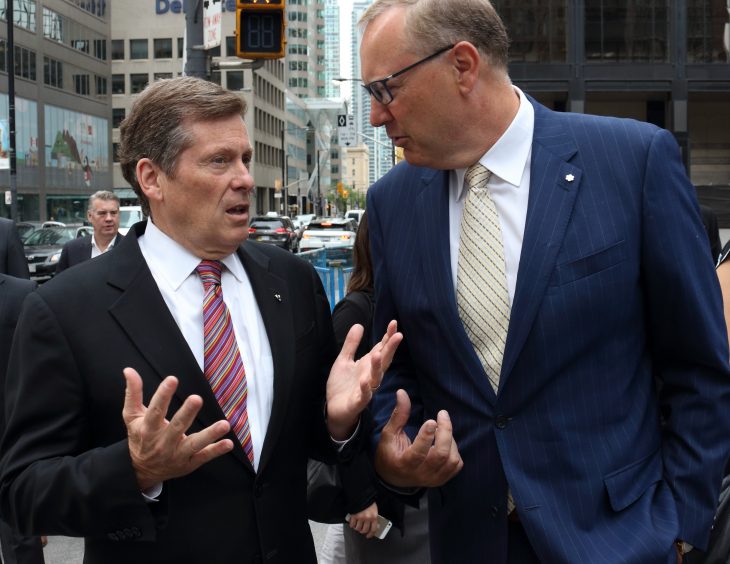
TORONTO – Bell Canada said today it will spend $1.4 billion in Toronto alone to bring fibre to every home and business, and then upped the stakes even further by announcing it will soon bring 1 Gbps speeds to many cities in its footprint – which is up to four times as fast as cable companies offer most of their subscribers in Bell's area.
BCE CEO George Cope said Thursday that Gigabit Fibe Internet and television service will start this summer some Toronto neighborhoods, and will be extended to all of Toronto in three years. Quebec City and Halifax will see just under 1 Gbps service by the end of the summer, and will be over that mark next year. The plans also call for 2,400 new jobs.
While Google sells 1 Gbps service in parts of some U.S. cities, Cope said the Toronto coverage of 1.1 million homes and businesses will be the largest of any North American city.
What Bell will charge for this premium service is unknown at this point. The telco will be silent about pricing until service actually launches. In addition to buying service, customers will also have to pay for a modem (which will include Wi-Fi), a termination box and a backup power supply inside the building or home.
All Cope would say at the launch event in Toronto this morning is it will be competitive. "This needs to be a mass consumer product."
Bell is spending $1.4 billion in Toronto alone to add a gigabit fibre overlay to its existing Fibe network there, which right now offers download speeds of up to 50 megabits per second. By comparison, Rogers offers download speeds of up to 250 Mbps.
Cope said the overlay will be "our largest and most ambitious infrastructure project in our 135 year history," allowing consumers to download an HD movie in seven seconds.
Unlike the current Bell Fibe service, which brings fibre optic to the nearest network node, this construction will bring fibre direct to homes and businesses. "What Gigabit Fibe does is ensure Toronto will be the smart city and a world leader in broadband technology," Cope said.
"Our largest and most ambitious infrastructure project in our 135 year history." – George Cope, BCE
Areas in Toronto where there is new construction will see the 1 Gbps service first, he said.
Telecom analyst Mark Goldberg said upping Bell's speed to 1 Gbps is necessary for it to fight for customers with cablecos. "It strikes me as a critical investment telephone companies are going to have to make to compete with the speeds that cable companies are offering today."
Five days ago Telus Corp. said it will spend $1 billion to connect more than 90 per cent of Edmonton homes and businesses directly its fibre optic network over the next six years for speeds of up to 150 Mpbs.
Some communities in the country already have 1 Gbps service. Two years ago, for example, OneGigabit.ca launched gigabit service in certain Vancouver buildings and Shaw has been testing 1 Gbps in select areas of Vancouver and Calgary.
The fastest service in Toronto is 500 Mbps offered by Beanfield Metroconnect to business and homes in a newly-developed lakefront community which is only starting to be populated.
Goldberg noted that while cablecos can offer faster speeds than the 250 Mbps many sell now, they can’t monetize that level because most residential customers are buying service around 100 Mbps.
There aren't enough Internet applications yet to justify faster speeds, he said. That may change as more customers want to stream television and movies over the Internet to computers and high definition TVs and want a digital home.
Photo of Bell CEO George Cope, right, with Toronto Mayor John Tory at this morning's announcement, by Howard Solomon.



